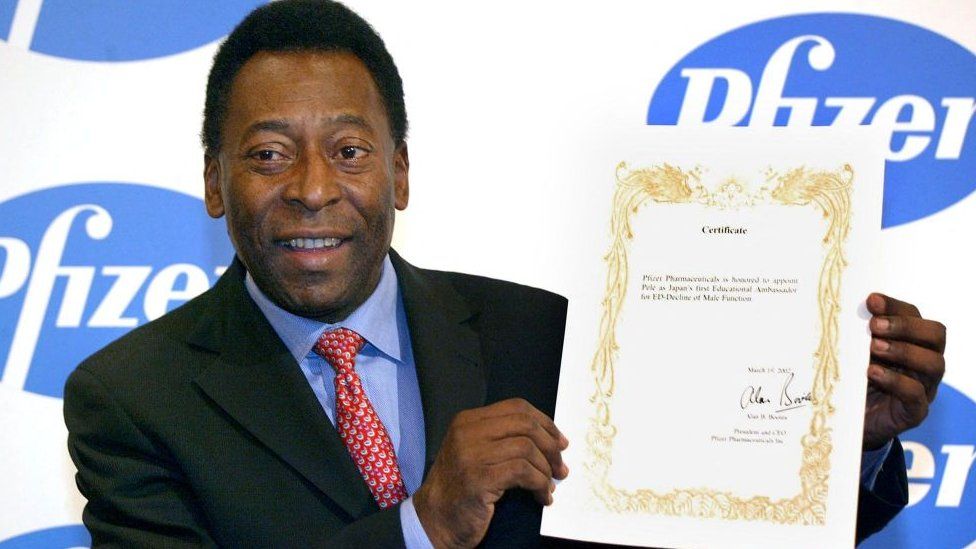ARTICLE AD BOX
 Image source, Getty Images
Image source, Getty Images
Brazilian legend Pele, arguably the world's greatest ever footballer, was a Viagra ambassador
By Peter Shuttleworth
BBC News
Pele may have been its poster boy - and the Pope gave it his blessing - but if it wasn't for a south Wales industrial town, we may never have known about Viagra.
Men from Merthyr Tydfil, including ex steelworkers desperate for cash during the town's industrial decline, went to a local research centre to volunteer as medical guinea pigs.
Little did they know the trial they were agreeing to take part in helped change the world.
Because it wasn't until 30 years later that some of them discovered it laid the foundations for the drug that has since helped millions of men with erectile dysfunction.
At the start of the 1990s, drug company Pfizer was testing a compound called Sildenafil UK-92,480 in an effort to treat high blood pressure and angina.
It contracted medical studies out of a research house in Merthyr Tydfil and recruited local young men to test it.
Idris Price was one of the men who signed up to test the new drug in 1992.
At the time he was going from job to job having been laid off in the local steelworks.
"If I was short of money, I'd go down this place called Simbec," Idris said.
Image source, BBC / TWO RIVERS MEDIA
Image caption,Idris Price says he and fellow volunteers in Merthyr Tydfil didn't know the angina drug they tested led to the creation of Viagra
He would ask what studies he could do for cash, adding: "We were told nothing about the drug apart from the doctor said the tablet is for angina and you might have side effects.
"A lot of the boys were nervous about what was going to happen."
The volunteers, all young men, were paid to take the compound UK-92,480 pill three times a day for 10 consecutive days.
"In the late 1980s and early 90s, it was very hard times for us and you'd try to get any money you could get," Idris told BBC documentary Keeping It Up.
"The money from the trial was very important to my family as we had nothing in those days.
"It allowed us to get in extra food and instead of having two bags of coal for the fire, we had five. It was actually a doddle, easy money which came in handy."
But when the trial was over, unforeseen side effects from the drug proved the "lightbulb moment" for Pfizer.
How was Viagra discovered?
"Volunteers started coming forward and saying 'it's a little embarrassing, but I've noticed I'm getting more erections than usual - and the erections are a lot harder than usual'," said Dr Pete Ellis, Pfzier's former discovery and development lead.
The chance observations in Merthyr Tydfil saw Pfizer put funding together to launch an impotence study.
Image source, Getty Images
Image caption,Merthyr Tydfil is an industrial town in the south Wales valleys that was hit hard by the decline of heavy industry in the 1980s and 1990s
Patients with erectile dysfunction were tested at Bristol's Southmead Hospital, before a further clinical trial the following year in 1994 in Swansea.
The clinic at Swansea's Morriston Hospital was the widest spectrum as it included men with diabetes and heart disease, where the side effects can include erectile dysfunction.
"Pfizer said they had to be heterosexual men in a stable relationship," recalled trial leader and endocrinology consultant David Price.
"They were all regular guys, all married and ordinary blue collar Swansea men. The trial included showing the men erotic videos."
Image source, BBC / TWO RIVERS MEDIA
Image caption,David Price said his clinical trial of Viagra had a huge impact on his patients and their partners
A device was attached to the penis of the men to monitor the drug's impact and doctors reassured the men they wouldn't be interrupted.
The results from the Swansea trial, like the Bristol study, were positive.
Pfizer quickly realised they had a potentially game-changing drug on their hands.
In fact so positive were the results, several men refused to return their unused tablets.
Pfizer's marketing team then kicked into overdrive on how to land their message of this new pill as experts pondered whether it'd be seen by the public as "extremely special or disastrous".
The firm was concerned about launching what could be described as a sex drug into what they thought was a relatively conservative world - so they used the feedback from men on the trials as their marketing message.
Viewers can watch the big story of the little blue pill on BBC iPlayer and on BBC Two on Friday at 21:00 GMT.
"One idea from the research was how deeply impotence impacts a person's sense of self, the other was how much this impacted relationships," said Pfizer's former senior marketing manager Jennifer Doebler,
"I was deeply touched by what men were saying and how much this hurt relationships and how much it mattered to them."
To boost their PR message that their possible impotence cure could repair struggling relationships, Pfizer got religious blessing from the Vatican by saying Viagra could help the institution of marriage and strengthen family values.
Viagra hit the shelves in the USA and UK in 1998 as the first approved oral treatment for erectile dysfunction in a blaze of publicity and quickly became the fastest selling drug in history with annual sales peaking in 2008 of almost $2bn.
But Idris, oblivious to the fact the side effects fellow volunteers reported helped create Viagra, was unaware of Merthyr's role in Viagra's story until researchers from BKeeping It Up told him earlier this year.
Image source, BBC / Quay Street Productions / Tom Jackson
Image caption,The Russell T Davies' feature-length drama Men Up will be one of the BBC 's flagship shows over the festive period
The story of Viagra's origin in south Wales has been made into a feature-length drama Men Up, which counts Doctor Who and It's A Sin's Russell T Davies as an executive producer, and is to be broadcast on BBC One over Christmas.
"I was amazed when I found out," Idris said.
"Viagra is a big thing now... I'm glad it was found in Merthyr Tydfil."
Viagra co-founder Dr David Brown said if it wasn't for the men of south Wales, Viagra may not exist.
"They made history," he said.
"They were probably just desperate to earn a bit of income but they've made a big difference to many people's lives and they should feel good about that."
Image source, BBC / TWO RIVERS MEDIA
Image caption,Viagra co-founder Dr David Brown thanked the men of south Wales for their part in helping make medical history
How common is erectile dysfunction?
The NHS says impotence or erectile dysfunction is "very common, particularly in men over 40" and some research estimates it can effect about half of all men between the ages of 40 and 70 - so more than four million men in the UK.
Other studies suggest that by 2025, 322 million men across the world may be affected by erectile dysfunction - more than double of the estimated 152 million in 1995.

 1 year ago
38
1 year ago
38








 English (US) ·
English (US) ·